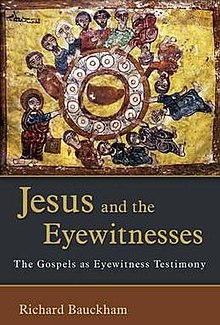 | |
| Author | Richard Bauckham |
|---|---|
| Language | English |
| Genre | Religion |
| Publisher | Eerdmans |
Publication date | 2006 2017 (second edition) |
| Pages | 504 pages |
| ISBN | 0802863906 |
Jesus and the Eyewitnesses: The Gospels as Eyewitness Testimony is a book written by biblical scholar and theologian Richard Bauckham and published in 2006 (Grand Rapids: Eerdmans).
The book challenges the consensus view that, "while the eyewitnesses originated (at least some of) the traditions about Jesus, these were then transmitted as anonymous traditions in the early Christian communities, developing in all sorts of ways in the process, and reached the Gospel writers as the product of such community transmission and development."[1] It argues that the synoptic Gospels are based "quite closely" on the testimony of eyewitnesses, while one (the Gospel of John) is written by an eyewitness, which he argues is John the Elder.[1] The final chapter offers a theological argument against the dichotomy between the Christ of faith and the historical Jesus.[1]
Ben Witherington III described Jesus and the Eyewitnesses as a paradigm shift in Gospels study.[2] In a special issue of the Journal for the Study of the Historical Jesus devoted to the book, Samuel Byrskog described it as "a remarkable achievement which rightly places the role of eyewitnesses in early Christianity on the international scholarly agenda and points to its historical and theological significance."[3] According to Judith CS Redman, this book also contributes among others to "offer a new paradigm which does not ignore the Fourth Gospel in the search for historical information about Jesus".[4] According to historical Jesus scholar Sara Parks, it is "a blend of careful work which contributes to scholarly knowledge, and of heavy bias which only contributes to the polemical din" which "has always characterized Historical Jesus Research".[5] Alan Kirk praised Bauckham for realizing the deep link between true memory and tradition, potentially contributing widely to Jesus research and the demise of form criticism, and his pioneering and underappreciated application of cognition and memory to the Jesus tradition. However, Kirk argues that Bauckham's failure to bridge the divide between eyewitness testimony and the Jesus tradition is detrimental to the overall case the two editions of Jesus and the Eyewitnesses provides. [6]
It was awarded the 2007 Christianity Today book award in biblical studies[7] and, in 2009, it received the Michael Ramsey Prize for theological writing, one of the judges stating that the work “placed something of a bomb under a good deal of New Testament scholarship".[8]
Bauckham reflected in a 2016 debate on Premier Christian Radio that when the book was first published there was a "huge range of reactions, from people who are wildly enthusiastic to people who absolutely hate it", and noted that his debate partner Bart D. Ehrman disagreed with his conclusions.[9]
An expanded second edition of Jesus and the Eyewitnesses was published by Eerdmans in 2017.
Kamil Gregor and Brian Blais critiqued Bauckham's view that the statistical distribution of names in the Gospels and Acts correspond strongly with that of Jews at the time and that this shows the figures in the New Testament are mostly historical. [10] Luuk van de Weghe and Jason Wilson responded to the paper in turn, arguing that the name statistics of the Gospels and Acts are very congruous with those of Jews of their time. [11]
- ^ a b c "The Michael Ramsey Prize for theological writing" (PDF). richardbauckham.co.uk. Archived from the original (PDF) on 2015-06-13. Retrieved 2020-08-18.
- ^ "Jesus and the Eyewitnesses". 31 December 2011.
- ^ Byrskog, Samuel (2008). "The Eyewitnesses as Interpreters of the Past: Reflections on Richard Bauckham's, Jesus and the Eyewitnesses". Journal for the Study of the Historical Jesus. 6 (2): 157–168. doi:10.1163/174551908X349653.
- ^ Skinner, Christopher W., ed. (2013). Characters and characterization in the Gospel of John. Bloomsbury. p. 69.
- ^ Parks, Sara (2007). "REVIEW of Jesus and the Eyewitnesses (by Richard Bauckham)". Arc: The Journal of the Faculty of Religious Studies.
- ^ Kirk, Alan (2017). "Ehrman, Bauckham and Bird on Memory and the Jesus Tradition". Journal for the Study of the Historical Jesus. 15 (1): 88–114. doi:10.1163/17455197-01501004.
- ^ "Book Awards 2007". ChristianityToday.com. 23 May 2007. Retrieved 2020-08-18.
- ^ "The Michael Ramsey Prize - 2009 Winner". www.michaelramseyprize.org.uk. Archived from the original on 2018-01-28. Retrieved 2020-08-18.
- ^ Justin Brierley, Bart Ehrman and Richard Bauckham (9 April 2016). Unbelievable? Are the Gospels based on eyewitness testimony? Bart Ehrman vs Richard Bauckham (Radio). Premier Christian Radio. Event occurs at 03:56. Retrieved 13 September 2016.
- ^ Gregor, Kamil; Blais, Brian (2023). "Is Name Popularity a Good Test of Historicity?". Journal for the Study of the Historical Jesus. 21–3 (3): 171–202. doi:10.1163/17455197-bja10023.
- ^ van de Weghe, Luuk; Wilson, Jason (2024). "Why Name Popularity is a Good Test of Historicity". Journal for the Study of the Historical Jesus. 22–2 (2): 184–214. arXiv:2403.14883. doi:10.1163/17455197-bja10035.